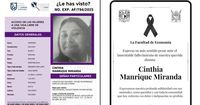Cinthia Manrique Miranda, a 34-year-old postgraduate student at the National Autonomous University of Mexico (UNAM), was found dead on April 15, 2025, in Naucalpan, State of Mexico, after being reported missing on April 10. Cinthia, who specialized in gender studies and taught a course on the subject at the Faculty of Economics, was last seen alive at the university where she was a beloved member of the academic community.
The tragic news of her death has sent shockwaves through the university and sparked outrage among students, faculty, and feminist groups, who have begun mobilizing to demand justice and enhanced safety measures for women on campus. Cinthia's disappearance and subsequent death have raised serious questions about the circumstances surrounding her last known whereabouts, as conflicting reports have emerged regarding whether she was last seen at the university or in Naucalpan.
According to reports, Cinthia was last in contact with friends during an online class that ended around 9:30 PM on April 10. She was reported missing shortly after, prompting her family and friends to seek help from authorities. Despite the official missing person's report indicating she disappeared in Naucalpan, many in the university community believe she may have been at the Ciudad Universitaria that day. This discrepancy has led to calls for a thorough investigation, including a review of security footage from the campus.
The UNAM has expressed its deep regret over Cinthia's death, issuing a statement that condemned the femicide and extended condolences to her family and friends. The statement read, "With full respect for the pain and mourning of her family, friends, and fellow students, we express our indignation at this fact and firmly demand that those responsible face justice." The university has also activated its Protocol of Action in Case of a Missing Person, which involves providing legal support to Cinthia's family and safeguarding potential evidence for the investigation.
In light of Cinthia's death, feminist groups and students have been vocal about the need for immediate action to improve safety on campus. They have called for clearer protocols for reporting and responding to missing persons, as well as ongoing campaigns to raise awareness about violence against women. Activists argue that the university must take a more proactive role in ensuring the safety of its students, particularly women who are often more vulnerable to violence.
On social media, students and friends of Cinthia have shared her story, urging authorities to investigate her death with a gender perspective. They have highlighted the alarming trend of femicides in Mexico, where violence against women has reached crisis levels. Cinthia's case is a tragic reminder of the dangers faced by women in both public and private spaces.
As the investigation into Cinthia's death continues, the community is demanding transparency from the authorities. The State of Mexico's attorney general has yet to release details regarding the circumstances of her death, which has fueled criticism over a perceived lack of urgency and transparency in the investigation. Activists have pointed out that Cinthia had previously expressed concerns about her safety, and there are indications that she may have experienced threats related to personal issues, including conflicts with the father of her three-year-old son.
The UNAM has committed to cooperating with the investigation and has expressed its determination to support measures that ensure the safety of its students. The faculty where Cinthia studied and taught has been particularly active in rallying support for her family and advocating for justice. They have also been working closely with feminist organizations to address the larger issues of gender-based violence in society.
As the community mourns Cinthia’s loss, there is a palpable sense of urgency to address the growing crisis of violence against women in Mexico. Students and activists are planning protests and vigils to honor Cinthia's memory and to call for systemic changes that will protect future generations of women. The response to her death has highlighted the need for ongoing conversations about gender equality, safety, and justice in academic institutions and beyond.
In the wake of this tragedy, the university and broader community are grappling with the implications of Cinthia's death. Many are asking how such a horrific event could occur and what can be done to prevent similar incidents in the future. The outpouring of grief and anger reflects a collective demand for accountability and change, as Cinthia's story resonates with countless others who have faced similar fates.
As investigations proceed, the hope is that Cinthia's story will not only lead to justice for her but also catalyze a movement towards greater safety and respect for women throughout Mexico. The university community stands united in their call for change, determined to ensure that Cinthia’s legacy inspires action and awareness in the fight against gender violence.








